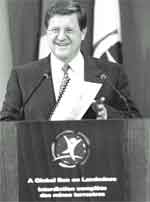Not mine, says India
 canada became the first nation to sign the historic treaty imposing a total ban on anti personnel landmines ( apls) in Ottawa, Canada, on December 4, when the treaty was opened for signing. By the evening of December 5 when the conference ended, 121 countries had signed the accord. India, Pakistan, the us , Russia, and China stayed out of the "convention on the prohibition of the use, stockpiling, production and transfer of apls and their destruction". Other countries that refused to sign include Iran, Iraq, Turkey, Libya, Egypt, Israel, North Korea, South Korea and Vietnam.
canada became the first nation to sign the historic treaty imposing a total ban on anti personnel landmines ( apls) in Ottawa, Canada, on December 4, when the treaty was opened for signing. By the evening of December 5 when the conference ended, 121 countries had signed the accord. India, Pakistan, the us , Russia, and China stayed out of the "convention on the prohibition of the use, stockpiling, production and transfer of apls and their destruction". Other countries that refused to sign include Iran, Iraq, Turkey, Libya, Egypt, Israel, North Korea, South Korea and Vietnam.
The treaty requires signatories to destroy their stockpiles of apls within four years and remove deployed mines within 10 years. The treaty will take effect six months after 40 of the signatory nations get it ratified by their legislatures.The enforcement of the treaty is expected to get underway in two to three years.
But this has in no way diluted the significance of the treaty. A strong movement has emerged against apls as a result of about seven years of participation and campaigning on the part of various governments, non-governmental organisations and activists. Countless organisations have been coming out with studies that show the dangers posed by apls.
According to a recent study commissioned by the International Committee of the Red Cross ( icrc ), there are 60 to 100 apls in 69 countries around the world and they kill or maim more than 25,000 people every year. The icrc-sponsored study revealed that there is one apl for every 48 people in the world, and for every mine cleared, 20 more are laid. Karl Inderfurth, the chief observer of the us delegation to Ottawa, pointed out that the world spends about us $200 million every year on clearing apls.
A number of victims of landmines were present in wheelchairs as the conference started. They cheered as Canada, which has been the chief lobbyist for the treaty, begin the process of signing. Kofi Annan, the United Nations general-secretary, called the treaty "a historic victory for the weak and the vulnerable of the world". Annan described the movement that has emerged in a short span of time against apls as "an alliance that has shamed the world and enlightened it". "It has, for once, made the international commu-nity a living, thriving reality," he said. He added that the success of the convention is a welcome reminder that one does not have to be a global superpower to affect the future of international peace and security. "The Ottawa Con-vention is a landmark step in the history of disarmament. About this, there can be no doubt."
Jody Williams, who shared this year's Nobel peace prize for her activism against apls, also addressed the conference. "Here we have 125 governments recognising that the tide of history has changed," she said.
Even the nations that have refused to sign the treaty are not against it. This was made clear by each country sending a delegation to the conference. "We are part of this process," said Inderfurth. The us has said it would sign the treaty only if exemptions are made for its troops in Korea and allowed the use of its anti-tank munitions. But supporters of the ban in the us were dismayed at the response of the administration.
"I am extraordinarily disappointed that the us is not signing.I would have liked that more than anything else in my years in office," said Patrick Leahy, Democrat senator from Vermont. Jack Quinn, a Republican who represents New York in the us Congress, said that some us politicians were unfamiliar with the extent of carnage caused by apls around the world. "If one single landmine exploded in the us , they would be trampling over one another to get a bill passed," he said.
On the other hand, despite refusing to sign the treaty, India has not been criticised. Although both India and Pakistan used apls during the three wars, both countries have taken special care to remove them from demarcated and mapped areas along the line-of-control. This has been acknowledged by the icrc. India has favoured a phased approach to banning apls, whereby countries first come together to stop their export and then have an agreement to prevent non military users such as terrorist groups from getting hold of these weapons before signing a treaty imposing a total ban.
Related Content
- Guidelines for prevention of misclassification of different grades of iron ore and other minerals
- Mineral (Auction) Amendment Rules, 2023
- Order of the National Green Tribunal regarding MoEF notification permitting the use of coal with ash content higher than permitted earlier, 10/06/2021
- India coal stockpiles at record high at close of financial year 2020-2021
- The Toxic Truth: Children’s Exposure to Lead Pollution Undermines a Generation of Future Potential
- Bolivia looks for tie up with India on Lithium mining, says Envoy
